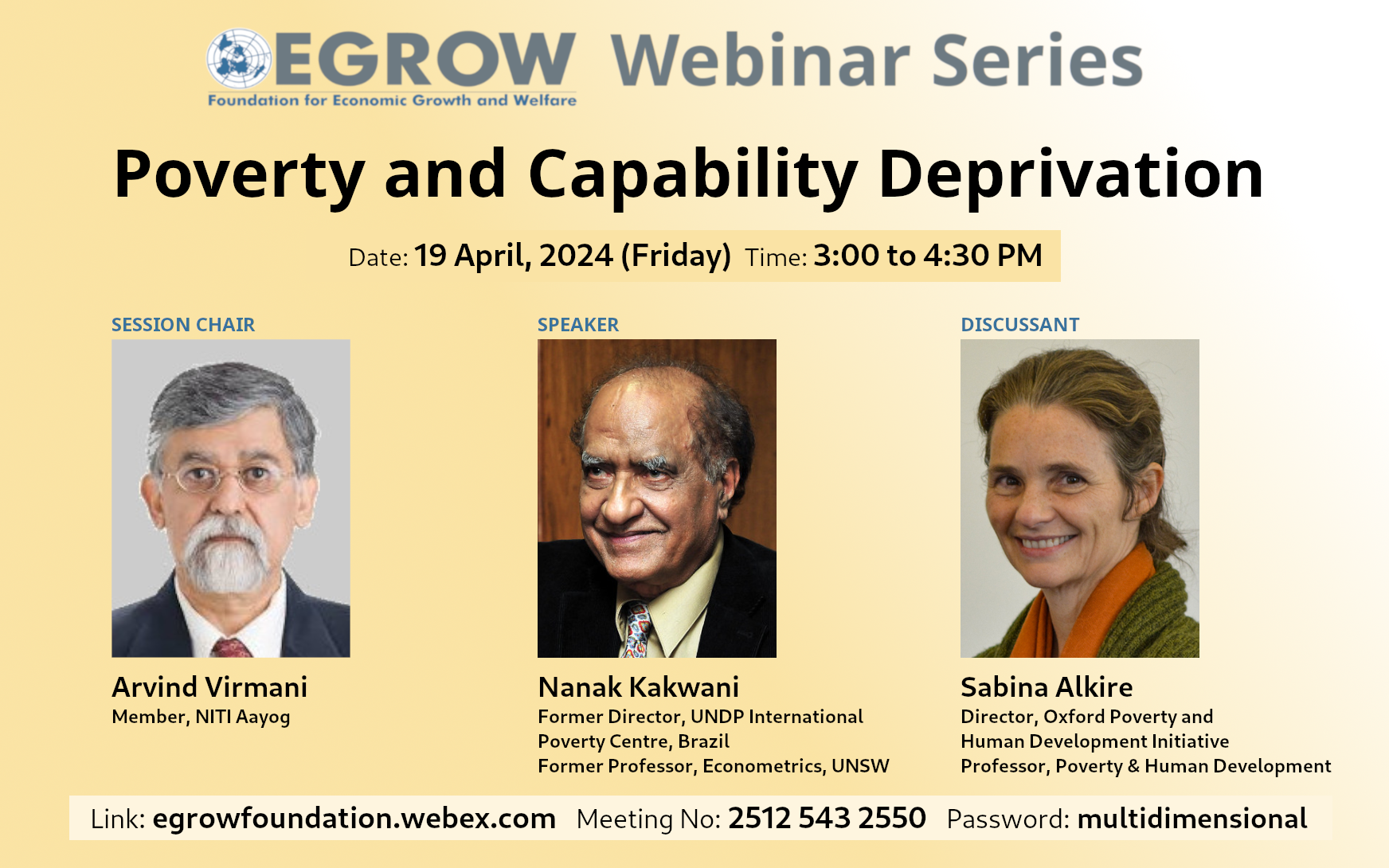Poverty and Capability Deprivation

Webinar Link
Meeting No: 2512 543 2550
Password: multidimensional
Certificate of Participants
To recieve certificates, please register and attend
Abstract
Poverty must arise when the essential capability failure is caused by inadequate command over resources through markets, public provision, or other non-market channels. However, identifying poor persons remain difficult through an examination of capability deprivation alone.
Many of the previous literature on multidimensional poverty indices, have focused on capability deprivation, ignoring the insufficiency of means available to individuals.
In this webinar the speaker makes a distinction between poverty and capability deprivation and criticises the multidimensional poverty measures proposed in the literature. A new method to measure the same is offered which takes account of insufficiency of means available to
individuals, to achieve essential capabilities.
About the speakers
Arvind Virmani
Arvind Virmani is member of NIti Aayog. He was Chairman of the Foundation for Economic Growth and Welfare (EGROW) and President of the Forum For Strategic Initiatives (FSI, Delhi). He has been a Mentor (economic policy) to FICCI & a member of RBI Technical Advisory Committee on Monetary policy.
He was earlier Executive Director, IMF and Chief Economic Advisor, Ministry of Finance and Principal Advisor, Planning Commission. During his tenure he advised on a host of economic policy reforms, through 100s of policy papers, notes and committees. He has served as Member, Telecom Regulatory Authority of India (TRAI) and as Director & Chief executive of the Indian Council for Research on International Economic Relations (ICRIER).
He has published 35 journal articles and 20 book chapters and written over 50 other working papers in the areas of Macroeconomics, growth and finance, tax reform, International trade & Tariffs, International relations, and national security strategy.
Nanak Kakwani
Nanak Kakwani is appointed Distinguished Fellow of the Gulati Institute of Finance and Taxation in India, September 2021. He has been Visiting Professor of Economics at the China Institute for Income Distribution at Beijing Normal University, China, since 2017. He was a Professor of Economics and Head of the Department of Econometrics for 30 years at the University of New South Wales in Sydney, Australia, during 1970–2000. He was Chief Economist and Director of the UNDP International Policy Centre for Inclusive Growth in Brazil from 2004 to 2006.
Kakwani's research areas include poverty, inequality, pro-poor growth, taxation, public policies, human development, and social welfare. He has published more than 100 papers in leading international journals (including nine papers in Econometrica) and six books published by reputed publishers like Oxford University Press, Cambridge University Press, Palgrave Macmillan, and Edward Elgar.
He was elected as a Fellow of the Australian Research Committee of Social Science and wasawarded the Mahalanobis gold medal for outstanding contribution in quantitative economics. His well-known Kakwani Index has been a standard measure for progressivity in taxation and other social science.
Sabina Alkire
Sabina Alkire is the Professor of Poverty and Human Development and directs the Oxford Poverty and Human Development Initiative (OPHI) at the University of Oxford. Previously, she worked at the George Washington University, Harvard University, the Human Security Commission, and the World Bank. She has a DPhil in Economics from the University of Oxford.
Together with Professor James Foster, Sabina developed the Alkire-Foster (AF) method for measuring multidimensional poverty, a flexible technique that can incorporate different dimensions, or aspects of poverty, to create measures tailored to each context. With colleagues at OPHI this has been applied and implemented empirically to produce a Multidimensional Poverty Index (MPI). The MPI offers a tool to identify who is poor by considering the range of deprivations they suffer. It is used to report a headline figure of poverty (the MPI), which can be unpacked to provide a detailed information platform for policy design showing how people are poor nationally, and how they are poor by areas, groups, and by each indicator.
Sabina was elected a Fellow of the Academy of Social Sciences in the UK 2021 and was voted one of the top 100 thinkers by Forbes magazine in 2010.